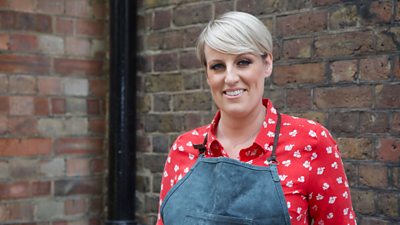Made In Great Britain
Ep. 1/6 -

In this episode our four craft-makers experience Sheffield’s rapid transformation from a rural market town to an industrial powerhouse known as Steel City, famous throughout the world for making high-quality cutlery.
Sheffield cutler Corin Mellor leads our four makers back in time. Starting in the 18th Century, the time travellers arrive at Abbeydale Works, once the largest water-powered site along the River Sheaf. They are immediately set to work and are tasked with hand forging a scythe. It’s a farming implement that has found recent fame when used by a shirtless Poldark, but it was also one of Sheffield’s biggest exports.
As a blacksmith, it’s familiar territory for maker Katie - but it’s the first time she has ever made such a primitive tool. Katie and Charlton work together in the forge to get the fire going using huge bellows. Katie usually has an electric fan in her modern forge, and bellows prove to be a lot more physically taxing. Then the two of them repetitively hit the heated steel with hammers, turning it into a curved blade. After an hour they are dripping with sweat. But there’s a disaster when the scythe cracks. The duo have to rapidly re-start the scythe and work under even greater pressure to get it finished before sundown!
Outside the forge, Claire and Jason work with temperatures hotter than lava to create ‘crucible steel’ - a process discovered in Sheffield and transformed the industry. They then jump on a traditional wet grinding wheel to have a go at grinding a sharp edge on a scythe blade. It’s extremely dangerous work: Claire and Jason have huge admiration for the Sheffield grinders, learning that many of them died early from lung diseases. The makers have a go at cutting the grass with their scythe with a new-found respect for the skill and craftmanship involved in making this farming tool.
Next, our makers head to the 19th Century - boom time for the cutlery industry. Presenter Steph McGovern (pictured) learns that the extravagant Victorians had a different piece of cutlery for every type of food! The makers step into the heart of a Victorian production line to make silver-plated cutlery, stamped with the fashionable King’s Pattern. This time they can use industrial machinery which vastly speeds up the process - no more hand forging!
Katie and Claire meet with two ‘buffer girls’ who used to sand the cutlery on giant buffing machines - a job that continued into the 20th Century. The ladies tell stories about their nights on the town in Sheffield and the mischief they got up to in the ‘buffing shops’.
The makers prepare the cutlery they’ve made for electroplating, a form of ‘blinging’ up their cutlery by covering it in silver. The makers need to use cyanide for this chemical process - Claire proceeds with caution working with such a toxic substance!
But the biggest transformations were yet to come. Travelling forward to the start of the 20th Century, the makers discover how at Portland Works the invention of stainless steel brought cutlery to the masses and they experience the rapid transformation of Sheffield into a war machine, making WWII Commando Knives using a heavy-duty drop stamp.
They finish their journey back in the 21st Century, where Corin Mellor takes our makers to his state-of-the-art factory - David Mellor Design. Here, they make high-end stainless steel forks from one of their bestselling ranges. With the City’s focus on quality rather than quantity, the makers learn that Sheffield’s historic cutlery industry is still thriving.
Publicity contact: PD
10:00 PM